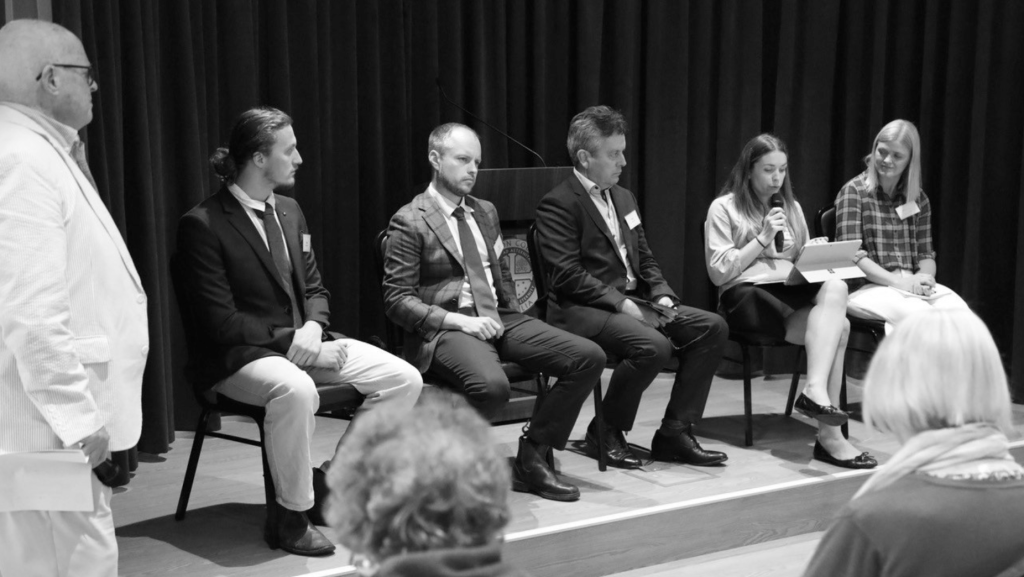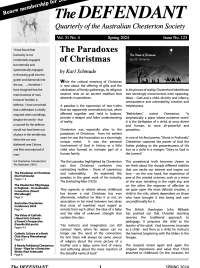During a panel discussion at the 2024 Conference, following Dale Ahlquist’s presentation on the Chesterton Schools, Fenelle McLaurin, a Campion College graduate, reflected on the value of a Catholic liberal arts education and why she would like this educational opportunity for her children. This is an edited version of her remarks.
I am a mother of four children, ages 8, 6, 4 and 2, and I am working with other parents in Western Sydney to explore the possibility of establishing a school in the Catholic liberal arts tradition in this area.
So why does a liberal arts education appeal to me as an educational possibility for my children? The answer is simple enough – because I have been and continue to be a beneficiary of an education in the liberal arts.
As a graduate of Campion, my own experience is that barely a day will go by where I don’t draw upon the intellectual inheritance of Western civilization in some way or another. It fuels my mind intellectually; it guides my decision making; it influences how I raise my children, what I teach them, the stories I share; and it is deeply embedded in how I perceive my life, how I choose to live, and what I consider worth doing.

Yet there is a further question. Is it chance that the liberal arts have been so valuable to me, or is there something inherent in them (or in us) that explains why studying “the best that has been thought and said” has the potential to transform the lives of those who do so?
I contend that it is the latter, and that an argument for this can be found within the tradition itself.
In the Nicomachean Ethics, Aristotle teases out what it is about the human person which is unique to them, in the hope that whatever is unique to humans will tell us something about their function (what it is that humans do). When we know their function, then we can know what happiness or flourishing looks like because it will be them doing that thing really well, or as Aristotle would say, performing their function to an excellent degree.
So Aristotle takes us through some contenders for the function of the human person. The first he considers is the life of nutrition and growth. We eat and we grow, that’s pretty cool, could that be the function of humankind? If we just eat and grow really well, would we be flourishing? Well no, Aristotle says, because plants do as much, so it’s not unique to humans. We do more.
Next he considers the life of perception. We can perceive things in a way, it seems, that plants cannot. Well again, no, Aristotle says, because animals do as much, they can see you and I in a way plants cannot, so perception is not unique to humans. We do more.
Finally, Aristotle proposes the ‘rational principle’: the capacity of humans to reason. Essentially Aristotle says yes. The unique function of the human person is to reason, so the ultimate end of a human is to reason well – to use our minds excellently. This, I believe, is what the liberal arts seek to aid.
Reason human and Godlike
It also ties in very beautifully with the Christian view that man is made in the image and likeness of God, and that it is precisely man’s ability to reason which resembles God’s own likeness.
The Christian understands that we do not value reasoning for its own sake, but because it is our capacity to reason which both reflects God and which enables us to pursue Him. As St John Paul II said, the rational capacity of humans is our capacity to know and choose what is true and good.
This is key: by our reason we come to know and choose what is true and good.
And so now we arrive at why the liberal arts are so valuable. Because when we study the best that has been thought and said, we are doing what we were made to do: we are using our rational capacity well to apprehend and choose what is true and what is good.
When we are fulfilling our telos, our ultimate end and purpose, we are flourishing, we are expressing our humanity more fully, and in that sense we are expressing our freedom.
After all, the term ‘liberal arts’ mean the ‘free arts’, as distinct from the servile arts or tasks of necessity. In this liberal space of reasoning not for work or for productivity or for sustenance, but for truth and goodness, we are expressing ourselves most freely in a way creatures bound to a life of necessity could never do.
When we use our reason to pursue ideas of goodness and truth, we are doing more than just surviving. You might say, it is when we are most human, or as the Christian could put it, our most Godlike.
Now these ideas have a tendency to sometimes sound faraway, airy fairy, or excessively conceptual. But like so many before me, I have experienced the reality of what the liberal arts have to offer the human person. The fruits of this are concrete. They are there for the taking.
I believe God made us in His image to pursue Him, and the liberal arts tradition is one expression of this wondrous capacity we have. It is a living expression of the rational capacity of mankind which has been continually engaged with, and which continues to offer relevance and value to us today.
In essence, the liberal arts help me pursue what is true and good. They liberate me from an existence limited to utility, survival, or God forbid, mere productivity. They help me strive to live in a way which authentically and freely expresses my humanity – and this is something I very much desire to give to my own children.
